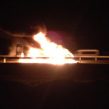
Suspected Chechen Servicemen Attack Journalists and Rights Activists in Ingushetia
Publication: Eurasia Daily Monitor Volume: 13 Issue: 50
By:

On March 9, unidentified assailants attacked a group of journalists and rights activists in Ingushetia. An estimated 15–20 armed men stopped the minivan with 8 rights activists and journalists in the border area between Ingushetia and Chechnya. The armed men forced the passengers of the minivan out, took away their cell phones, beat them up, and set their car on fire. Two of the journalists were from Sweden and Norway, which turned the incident into an international scandal (Interfax, March 9).
According to the sources in the police, the assailants apparently knew that the group of journalists and rights activists were on their way to Chechnya, including members of the well-known rights group, the Committee Against Torture, headed by Igor Kalyapin. The attack appeared to be specifically designed to prevent the group from entering Chechnya (Interfax, March 10).
Investigators are still looking for the perpetrators of the attack, but Kadyrov’s men are widely suspected to have been involved. According to Aleksandrina Yelagina of the New Times magazine, who was among those beaten up, the assailants said they should not go to Chechnya and that the journalists and rights activists were protecting terrorists. Kalyapin’s organization came under attack in Chechnya. In 2015, the Moscow activists who investigated serious rights violations such as kidnappings and torture had to move their offices from Chechnya to Ingushetia (Meduza.io, March 10).
The day of the attack, March 9, another group separately attacked the rights activists’ office in the Ingush city of Karabulak. “The attack on the Chechen border on March 9 took place due to Mr. Kadyrov’s opinion that Chechnya is his domain and all that is happening there should take place only after asking his permission or on his direct orders,” Kalyapin said. “Civilian control, investigative journalism, and human rights activities cannot exist in Chechnya. When he was informed that the journalists joined the Committee against Torture, it probably caused the outbreak of aggression. The Chechen authorities have been struggling to expel our organization from the republic for the past two years, but we persisted in spite of all the attacks, violence, intimidation, and defamation against us on an almost daily basis” (Snob.ru, March 11). Chechnya’s outspoken human rights ombudsman, Nurdi Nukhazhiev, told Dozhd TV that Kalyapin himself most likely organized the attack (Dozhd, March 10).
What makes the latest attack unusual is not only how brazen it was, but also Vladimir Putin’s reaction to it. Unexpectedly, Putin asked the Ministry of Interior to investigate the incident and “provide a legal assessment” of it (Interfax, March 10). Ramzan Kadyrov has been under immense pressure in the past several months. The prominent Russian opposition leader Boris Nemtsov was killed near the Kremlin, in Moscow, in February 2015, and investigators soon afterward detained several suspected Chechens. Although no proof of Kadyrov’s direct involvement in Nemtsov’s murder has been provided, some critics of the Kremlin are convinced Kadyrov was behind the assassination. The pressure on Kadyrov has mounted and his term as Chechnya’s governor is expiring. Hence, some Russian analysts say Putin is likely to replace Kadyrov with a more docile figure (Nv.ua, March 3).
The Kremlin’s reaction to the latest attack on rights activists and journalists connected to Chechnya seems to confirm that changes might be coming in the republic. Putin’s silence on Kadyrov’s reappointment is also quite telling, as it indicates that the Kremlin is still undecided about what to do with Kadyrov. Although some analysts say that dismissing Kadyrov will destabilize the republic, others argue that his importance is exaggerated. Putin’s spokesman, Dmitry Peskov, responded to the question about the possible destabilization of Chechnya after Kadyrov’s dismissal: “Is the situation [in Chechnya] any different from other regions? They have the same branches of power as elsewhere in the Russian Federation. Let us not forget that the region [Chechnya] belongs to the Russian Federation, where all Russian laws work” (Interfax, February 29).
Peskov certainly exaggerated when he said that all Russian laws work in Chechnya the same way as elsewhere in the Russian Federation. However, the Kremlin seems to be signaling to Kadyrov that he should scale down his notoriety in the news. Several sources told the RBC news agency that Putin intended to allow Kadyrov to run for governor again after he appoints him as interim governor (Rbc.ru, March 2), which is a legal nonsense because Chechnya is supposed to elect its governor in direct governor elections. In reality, however, Putin manages the region, personally dealing with the complexities of the situation on the ground. Given that he is facing many challenges abroad, Putin is likely to choose the easiest way to proceed in Chechnya—to reappoint the existing governor. However, regular leaks from the Nemtsov murder investigation and other scandals indicate that many Russians, including the Russian opposition, are united in their dislike for Ramzan Kadyrov. The only ally Kadyrov still seems to have is Vladimir Putin, and even he could sacrifice Kadyrov for political reasons, if necessary.




